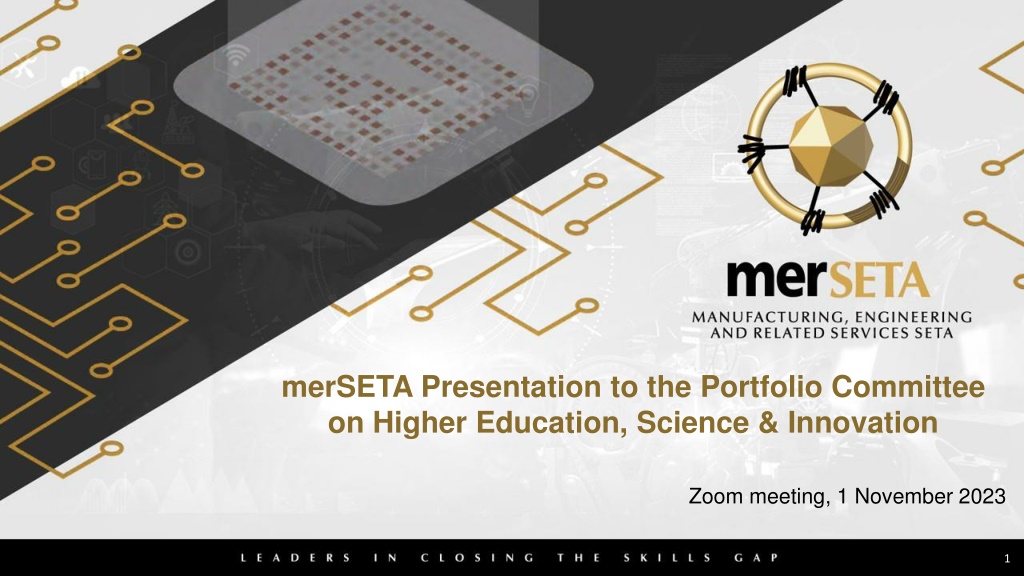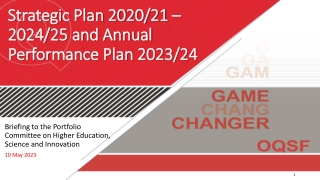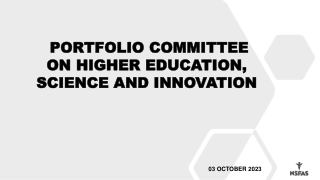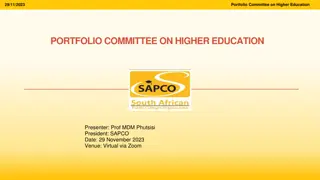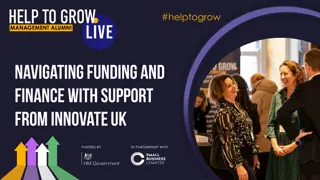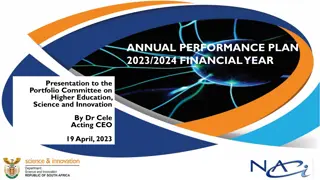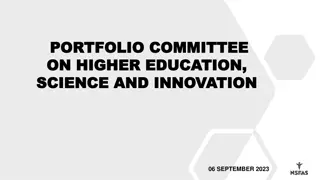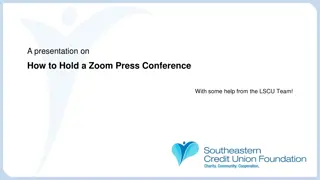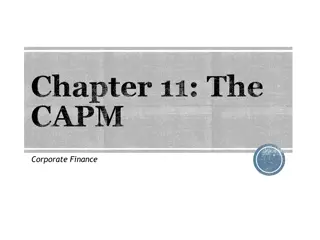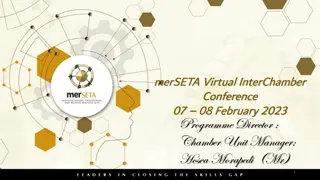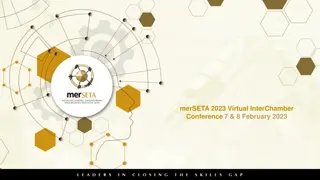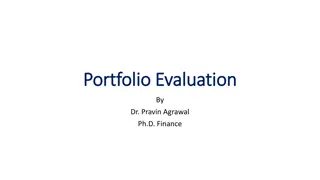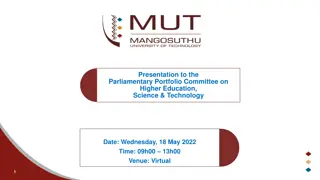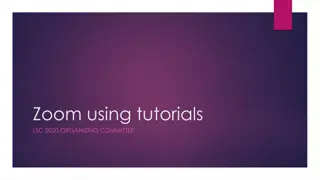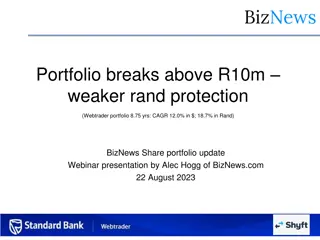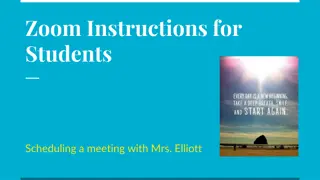merSETA Presentation to Portfolio Committee on Higher Education, Science & Innovation - Nov 2023 Zoom Meeting
The presentation showcases the merSETA team, including key members and their roles, accomplishments, challenges, and financial reports. It covers the organization's vision, values, and mission focusing on skills development, economic growth, and employability. The annual report for 2022/2023 highlights the importance of manufacturing in SA's economy, challenges faced, and strategies to improve sustainability, green practices, energy efficiency, and digital skills in manufacturing processes.
Download Presentation

Please find below an Image/Link to download the presentation.
The content on the website is provided AS IS for your information and personal use only. It may not be sold, licensed, or shared on other websites without obtaining consent from the author. Download presentation by click this link. If you encounter any issues during the download, it is possible that the publisher has removed the file from their server.
E N D
Presentation Transcript
merSETA Presentation to the Portfolio Committee on Higher Education, Science & Innovation Zoom meeting, 1 November 2023 1
Introduction to the merSETA Team merSETA AA Chairperson, Ms Kate Moloto (slide 3) merSETA Annual Report 22/23 merSETA ACEO, Ms Disa Mpande (slide 4 7) APP Achievements 22/23, Challenges and Mitigation Plans merSETA ACOO, Mr Naphtaly Mokgotsane (slide 8 14) Achievement against 5-year Strategic Targets (2020 2025) merSETA ACOO, Mr Naphtaly Mokgotsane (Slide 15 19) Finance & Budget Report: Audit Outcomes and Action Plan merSETA ACFO , Mr Andrew Venter (Slide 20 22) Progress on Investigations and Consequence Management merSETA CSE, Mr Rajesh Jock (slide 23)
The merSETA Team merSETA , Corporate Services Executive Mr Rajesh Jock merSETA ACOO, Mr. Naphtaly Mokgotsane AA Chairperson, Ms Kate Moloto merSETA ACEO, Ms Disa Mpande merSETA ACFO, Mr Andrew Venter 3
Annual Report 22/23 We Care VISION: Leaders in closing the skills gap VALUES: We Belong MISSION: To increase access to high quality and relevant skills development and training opportunities. To support economic growth in order to reduce inequalities and unemployment. To promote employability and participation in the economy We Serve 4
Annual Report 22/23 Manufacturing is central to the economic success of SA, contributing to employment, exports and GDP growth. Low economic growth impacting the manufacturing performance and investment potential. Also, high interest rates and poor exchange rates Slow Growth ECONOMIC FACTORS Competition from low-cost manufacturing countries, requiring continuous innovation and efficiency improvement. Global Competition Energy Constraints intermittent power supply and high energy costs, impacting production processes and competitiveness INFRASTRUCTURE CHALLENGES Transportation Inadequate transportation infrastructure hampers the movement of goods, leading to logistical challenges. Reduce the environmental impact Reduce carbon footprint and ensure green practices are implemented. Adopt circular economy. Sustainability & Green Manufacturing Improve energy efficiency & adopt renewable energies Improve efficiencies and transition to renewable energies such as solar, wind, hydrogen. Adopt technologies in aid of the green agenda. Operate and maintain modern manufacturing equipment and processes. Key is automation, robotics, and advanced manufacturing technologies. Technical & Engineering Digitization of manufacturing processes requires a workforce proficient in digital skills, data analysis, and cybersecurity. Digital Literacy & Analysis SKILLS Research & Development Drive innovation, product development, and process improvement in the manufacturing sector. Foster the growth of small medium, micro-sized enterprises (SMMEs), Informal operations and cooperatives. Entrepreneurship & SMME Problem-solving, communication, teamwork, and adaptability is essential for a flexible and agile workforce in the rapidly evolving manufacturing landscape Skills Gaps & Transformation 6
Annual Report 22/23 Key Skills Drivers Skills Drivers Sub-themes Implications for Skills Development Deglobalisation Build skills pipelines to international levels of sophistication for local and export sales. Global Economic and Geopolitical Trends Reindustrialisation and localisation Build economic complexity to expand manufacturing and produce frontier products match skills to required developments. Invest in R&D to boost innovation. Cross sectoral partnerships to build required skills pipeline for renewable energy. Renewable Energy The Just Energy Transition & Environmental Sustainability The Circular Economy R&D to unpack potential to exploit opportunities at various parts of products production and life cycle NEVs Ensure updated curricula and competence in line with industry requirements to meaningfully participate. Track technological advances and make ready skills opportunities for workers in line with these developments. Keeping pace with technological advancements and innovations to remain relevant Adopting New Technologies Assist small and medium businesses in terms of upskilling and reskilling in line with national development and technological advances. Track occupations at risk of displacement, change and additional tasks and reskill or upskill with more urgency placed on skills being replaced by tech in the short term. Focus skills interventions, projects and programmes on the youth, women and persons with disabilities. Transformation Developing a labour market to take up opportunities. Upskilling, reskilling Put in place clear mechanisms to build and navigate careers in line with new developments in terms of new and changing occupations, new markets and products. 7
APP 2022/23: Achievement Total Number of Targets = 60 Targets Achieved and Exceeded (29) Targets Not Achieved (31) Almost Achieved 75% - 99% on 6 Targets (19%) Achieved 100% on 12 Targets (41%) Not Achieved 0% - 49% on 16 Targets (52%) Achieved >100% on 17 Targets (59%) Partially Achieved 50% - 74% on 9 Targets (29%) 8
APP 2022/23: Achievement 2022/23 Target: Learners Registered = 11373 Performance Snapshot: 105% achieved 11995 Learners Registered 82% (9885) Unemployed, 18% (2110)Employed Registered Applies to learners on WIL programmes learnerships, skills programmes, internships, candidacy and AET 2022/23 Target for Learners Completed = 9894 104% achieved 10282 Learners completed 83% (8750) Unemployed, 15% (1532) Employed Completed Applies to learners on WIL programmes learnerships, skills programmes, internships, candidacy and AET 2022/23 Target completed: 3460 1709 completed 49% Achieved 2022/23Target registered: 3000 2138 registered 71% Achieved 2022/23 ARPL Target completed: 1040 742 completed 71% Achieved Artisans 2022/23 ARPL Target registered: 1000 862 registered 86% Achieved Apprenticeships, ARPL not separated by employed/unemployed in the data 9
APP 22/23 Achievements and Challenges Key Challenges targets not achieved Targets Not Achieved (0% - 49%) Low number of applications received from discretionary grant funding window Number of employed learners completing skills programmes 3.25 1420 674 Non-compliance with guidelines on learner records delays reporting and may result in rejections of registrations Number of unemployed learners registered for WIL programmes from TVET colleges. 3.4 361 114 Low uptake of training for employed learners by employers Number of employed or unemployed learners completing AET programmes 3.27 309 191 Better planning required to align reporting to academic year in terms of registrations and completions. Number of unemployed learners registered for workplace experience/internships. 3.8 221 129 Fewer workplaces available for placements Number of unemployed learners completing WIL programmes from TVET colleges. Indicators with less than 5 achieved Number of sector research agreements signed for TVET growth occupationally directed programmes. 3.15Number of unemployed engineering graduates completing candidacy programmes. 3.39 Number of trade unions supported through skills development. 3.36Number of Cooperatives funded for skills that enhance enterprise growth and development 47 3.5 178 2.5 Number of unemployed learners completing workplace experience/internships. 3.9 50 Number of employed learners registered for bursary programmes (new entries) 3.21 34 Number of TVET college Lecturers exposed to the industry through skills programmes 4.5 0 4.3 Number of TVET college lecturers awarded bursaries. Number of established and emergent cooperatives trained on sector and national identified priority occupations or skills. 2.6 Number of employed learners registered for bursary programmes (continuing) 3.22 0 3.23 Number of employed learners completing bursary programmes 0 300 600 900 1200 1500 1800 2100 3.22 Number of employed learners registered for bursary programmes (continuing) Number of TVET college Lecturers exposed to the industry through skills programmes Not achieved Achieved 4.5 10
APP 22/23 Targets Targets Partially Achieved (50% - 74%) Key Challenges targets partially achieved Low number of applications received from discretionary grant funding window Number of learners completing trade / artisan qualifications 3.29 1751 1709 Difficulties with ensuring partners submit compliant documentation on time impacts learner numbers linked to MoAs. Number of learners registered for trade / artisan qualifications (new registrations) 3.28 862 2138 Number of employed learners registered for skills programmes 3.24 828 1172 Records are not compliant with rules/guidelines/grants policy and therefore cannot be included in the achievement. Number of employed learners registered for learnership programmes 3.19 536 904 Indicators with less than 5 achieved Number of new SETA- Employer partnerships established. 3.35 377 1023 4.9 Number of CET colleges funded for merSETA occupational programmes, equipment and workshop infrastructure. Number of employed learners completing learnership programmes 3.20 329 854 Number of learners completing Artisan Recognition of Prior Learning (ARPL) programme 3.31 298 742 Number of unemployed learners registered for bursary programmes (new entries) 3.16 63 0 500 1000 1500 2000 2500 3000 3500 Not Achieved Achieved 11
APP 22/23 Targets Targets Almost Achieved (75% - 99%) Key Challenges targets almost achieved Difficulties with ensuring partners submit compliant documentation on time impacts learner numbers linked to MoAs. Number of learners entering Artisan Recognition of Prior Learning (ARPL) programme 3.30 138 862 Insufficient number of applications received. Applications reflect demand for different skills levels than those required in the target Number of small and emerging enterprises trained on sector and national identified priority occupations or skills. DG records rejected due to inability of applicants to comply with requirements 2.7 116 614 Learner records do not comply with requirements reducing numbers Number of employed or unemployed learners registered for AET programmes 3.26 72 438 Indicators with % Achievement No. INDICATOR NAME Percentage of total approved Discretionary Grants (DG) allocations to employers, allocated to programmes or projects aimed at developing elementary skills e.g. machine operators and elementary workers. Target Achieved Number of unemployed learners registered for WIL programmes from HEIs. 3.6 60 220 3.3 23% 22% Percentage of total approved Discretionary Grants (DG) allocations to employers, allocated to programmes or projects aimed at developing high-level skills e.g. managers, professionals and technicians and associate professionals. 0 200 400 600 800 1000 1200 3.1 22% 19% Not Achieved Achieved 12
Summary of Challenges 1 Low number of applications received from discretionary grant funding window Difficulties with ensuring partners submit compliant documentation on time. 2 Records are not compliant with rules/guidelines/grants policy and therefore cannot be included in the achievement. 3 4 Reduced number of workplaces makes placement difficult Low uptake of training for employed learners by employers 5 Skills levels required by employers for workers are not aligned resulting in reduced uptake for lower skills levels required on some targets 6 Partners do not achieve the required numbers as agreed to in their MoAs within the required time periods 7 Weaknesses in quality control processes hampers complete, accurate and valid reporting 8 13
Proposed Success Strategies to Overcome Challenges Targeted funding windows for key targets and targets which are lagging 1 Close monitoring of SDPs and partner MoAs to deliver on learner numbers for reporting 2 Review compliance document guidelines 3 Improved M&E of continuing agreements for reporting purposes. 4 Forming Strategic Partnerships with institutions to assist in achieving targets e.g. ECSA for candidacy 5 Careful consideration of requirements for each target and implementation of best practice 6 Increase allocations on targets where we expect a shortfall 7 Revise and improve on quality controls and internal controls to ensure valid, complete and accurate reporting 8 Investigate reasons for shortfall on key artisan targets 9 14
Achievement against 5-year Strategic Targets (2020 2025) The 2022/23 period represents 3 years of implementation of the 5- year plan. 0% 10% 20% 30% 40% 50% 60% 70% 80% 90% 100% Number of Non-Profit Organisations (NPOs) supported through skills 95% Number of career development events in rural areas on occupations in 74% Number of active SETA-HEI partnerships established 72% The achievement across most targets should be at 60% or more. Number of small businesses supported through skills development. 71% Number of career development and advice practitioners trained. 62% Number of WSPs and ATRs approved 60% Ideally, the merSETA should reach 80% achievement by 31 March 2023 (after 4 years of implementation) Number of rural development projects supported through skills 60% Targets Number of career development events in urban areas on occupations in 55% Number of new SETA-Employer partnerships established 54% Number of merSETA skills development programmes or projects 51% Coloured Bars = % of target achieved Green = on track Number of small and emerging enterprises trained on sector and national 46% Number of trade unions supported through skills development 25% Yellow = need to ramp up efforts Number of candidates undegoing Recognition of Prior Learning (RPL) 23% Number of people registered for entrepreneurship skills 21% Red = need keen efforts to increase targets Number of cooperatives supported through skills development 13% Number of established and emergent cooperatives trained on sector and 0% 15
Achievement against 5-year Strategic Targets (2020 2025) 0% 10% 20% 30% 40% 50% 60% 70% 80% 90% 100% Artisan targets Number of learners completing trade / artisan qualifications 36% Number of learner completing Artisan Recognition of Prior Learning (ARPL) programme 34% Number of learner entering Artisan Recognition of Prior Learning (ARPL) programme 30% Number of learners registered for trade / artisan qualifications (new registrations) 26% target % achieved 0% 10% 20% 30% 40% 50% 60% 70% 80% 90% 100% Employed learner targets Number of employed learners completing learnership programmes 39% Number of employed learners registered for learnership programmes 28% Number of employed learners completing bursary programmes 23% Number of employed learners registered for skills programmes 19% Number of employed learners completing skills programmes 18% Number of employed learners registered for bursary programmes (new entries) 14% Number of employed learners registered for bursary programmes (continuing) 1% target % achieved 16
Achievement against 5-year Strategic Targets (2020 2025) 0% 10% 20% 30% 40% 50% 60% 70% 80% 90% 100% 87% Number of unemployed engineering graduates registered for candidacy programmes 65% Number of unemployed learners registered for skills programmes 63% Number of unemployed learners completing skills programmes 59% Number of unemployed learners registered for learnership programmes Unemployed learner targets 57% Number of unemployed learners registered for bursary programmes (continuing) 45% Number of employed or unemployed learners registered for AET programmes 41% Number of unemployed learners completing learnership programmes 38% Number of unemployed learners registered for bursary programmes (new entries) 34% Number of learners in employment (unemployed learners completing internships, skills programmes, bursaries 29% Number of unemployed learners completing WIL programmes from HEIs 28% Number of unemployed learners completing bursary programmes 27% Number of unemployed learners registered for WIL programmes from HEIs 23% Number of unemployed learners completing workplace experience/internships 19% Number of unemployed learners registered for workplace experience/internships 16% Number of unemployed learners registered for WIL programmes from TVET 8% Number of unemployed learners completing WIL programmes from TVET 6% Number of employed or unemployed learners completing AET programmes 0% Number of unemployed engineering graduates completing candidacy programmes target % achieved 17
Towards improving Achievements: MANCO Initiated Projects Project Commitment No of recipients EON Knowledge Metaverse (AR and VR) R121,745,374 57500 (licenses) Gauteng Dept of Education (GDE) R55,000,000 11 technical schools Gauteng City Region Academy (GCRA) R172,500,000 5000 (Solar PV skills) National Student Financial Aid Scheme (NSFAS) R141,750,000 300 for 3 years (missing middle) NW Cooperative Governance And Traditional Affairs (NW COGTA) R12,705,000 44 (candidate engineers) Northern Cape Office of the Premier R210,135,000 2507 (multiple skills interventions and write-off of historical debt for graduates) Eastern Cape Office of the Premier R227,020,735 2420 (multiple skills interventions and write-off of historical debt for graduates) KwaZulu/Natal Office of the Premier R202,215,277 3550 (multiple skills interventions and write-off of historical debt for graduates) Free State Office of the Premier R245,682,467 885 (multiple skills interventions and write-off of historical debt for graduates) Retail Motor Industry Organisation (RMI) R1,080,000 14 (Sales Managers) 18
Towards improving Achievements: Strategic Research & Innovation Projects KEY THEMES INCLUDE: 1. Skills for localization of production: Phase 1 UCT, UJ, NMU partnerships: Phase 2 Industrialisation Fellowship from single product localization to Product Subsystem Localisation. 2. Supporting TVET Colleges to serve future occupations: Learning Factory, Professional Development of TVET Lecturers for future occupations, AdvDip TVET and PGDip TVET bursaries. 3. Curated digital learning pathways: ICT4App 4. Quality Development in teaching learning and assessment for engineering occupations. 5. WSU Partnership for Institutional Development. 6. Engineering Related Research Chairs & aligned post-graduate bursary support and business incubation TUT, NMU, UFS References - https://doi.org/10.15641/UCTLib40 - https://doi.org/10.14426/jovacet.v6i1.291 19
Finance & Budget Report STATEMENT OF FINANCIAL PERFORMANCE FOR THE YEAR ENDED 31 MARCH 2023 2023 Budget R'000 Actual R'000 Variance R'000 REVENUE Skills development levy income Skills development levy penalties and interest Interest income Total revenue * 1 589 547 15 098 289 274 1 893 919 1 560 434 15 888 263 296 1 839 618 29 113 ( 790) 25 978 54 301 EXPENSES Employer grant and project expenses Administration expenses Total expenses ** (1 184 176) (173 619) (1 357 795) (1 656 274) ( 183 344) (1 839 618) 472 098 9 725 481 823 Net surplus for the year 536 124 - 536 124 *Skills development levy income increased by 10% over the prior year **71% of the discretionary grant budget was spent. This is partly due to cancellation of contracts or reductions of commitments during the year amounting to R761 million. The closing date for submissions of applications for discretionary grants for the 2022/23 financial year was extended to the end of August 2022, meaning much of what was budgeted will now only be incurred in the 2023/24 financial year. 20
AGSA: Audit Outcomes Overview of the audit outcomes: Qualified with findings Audit Outcomes: Qualified with findings AFS (regressed) The outcome regressed in the current financial year, with the entity receiving a qualified opinion, based on the unadjusted misstatements of commitments, and consequently, the misstatements of discretionary grant expenditure, and accruals. AOPO (Stagnant) remained unchanged, for the past 3 years with the entity with findings on performance information relating to the reliability of the achievement. Compliance with laws and regulations stagnant (unchanged) Area of compliance with laws and regulations remains the same compared to the previous financial years as there were material findings identified during the currently audit cycle. Annual Financial Statement Expenditure Management Consequence Management 2022-23 2021-22 2020-21 2019-20 Qualified with material adjustments Unqualified with material adjustments 21
Action Plan to Address Audit Findings CATEGORY OF AUDIT FINDING REMEDIAL ACTION PLAN TIME FRAMES Strengthen end-to-end process of DG payments and reporting from claiming to payment to recording of accrual. Improve internal controls for discretionary grant contract management and related commitments Ensure compliance with irregular expenditure framework and related disclosure requirements Irregular, fruitless and wasteful expenditure Put in place mechanisms for prevention and improved management and monitoring of MoAs Management to implement effective planning to ensure financial processes can be timeously completed. Strengthen the quality control processes and documentation for capturing performance information. Closer monitoring of daily and monthly processing as per commitment schedules Build validation controls into the current Learner Management System To ensure accurate, valid and complete information Provide targeted training to improve compliance with data capture procedures Guidelines and checklists to be developed to strengthen accuracy Work with partners to improve submissions aligned to compliance requirements Closer partnership with the finance department to monitor commitments and ensure reporting in the correct period. To avoid misstatement of expenditure and accruals Staff training and capacity development for MoA compliance and reporting requirements ANNUAL FINANCIAL STATEMENTS Unadjusted misstatements of commitments and consequently the misstatement of expenditure and accruals leading to a qualification October 2023 PERFORMANCE INFORMATION (AOPO) Material findings on performance information relating to the reliability of the achievements reported October 2023 COMPLIANCE WITH LAWS AND REGULATIONS Non-compliance with laws and regulations in relation to understatement, prevention and disclosure of irregular and fruitless & wasteful expenditure, including consequence management Implement training on Irregular Expenditure Framework Improve management of irregular expenditure register Strengthen management of contracts (both discretionary grants and operational) Review Terms of Reference of the Loss Control Committee for more effective functioning July 2023 22
Progress on investigations and consequence management ITEM ITEM DESCRIPTION & EMPLOYEE STATUS CONSEQUENCE MANAGEMENT Forensic investigation: Senior Manager Program Implementation Forensic Investigation: Client Relationship Management Mpumalanga Forensic Investigation: Chief Operations Officer Forensic Investigation: Chief Executive Officer Forensic Investigation: Accounting Authority members (current and former) Investigation finalised Employee resigned Litigation to recover damages is underway. Investigation finalised Employee placed on precautionary suspension Disciplinary hearing underway Investigation finalised. Employee placed on precautionary suspension Investigation finalised. Employee placed on precautionary suspension Forensic investigation into CEO raised allegations into current and former members of the Accounting Authority. Employee status not applicable. Forensic investigation into CEO raised allegations against the Coordinator: ICT Employee placed on precautionary suspension AGSA tested the merSETA employee conflicts of interests. All current and former employees raised in this finding are being investigated through the services of a forensic investigator who has been appointed to conduct a probity check. Disciplinary hearing underway Charges have been served on CEO Disciplinary hearing to commence Forensic investigator appointed to conduct probity checks into the allegations raised against the AA members Disciplinary action against the employee has been placed on hold pending the outcome of the CEO's disciplinary hearing Forensic Investigation: Coordinator: ICT Not applicable at this stage AGSA COMAF Finding 23
